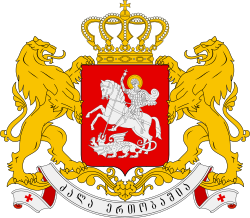| Party | National | Constituency | Total
seats |
|---|
| Votes | % | Seats | Votes | % | Seats |
|---|
| Union of Citizens of Georgia | 890,915 | 44.48 | 85 | | 46 | 131 |
| Revival Bloc (UDR–SPG–UGT–KGS–GFUM–MGSVN) | 537,297 | 26.82 | 51 | | 7 | 58 |
| Industry Will Save Georgia Bloc | 151,038 | 7.54 | 14 | | 1 | 15 |
| Georgian Labour Party | 140,595 | 7.02 | 0 | | 2 | 2 |
| National Democratic Alliance–The Third Way Bloc | 95,039 | 4.74 | 0 | | 0 | 0 |
| Popular Party–Digori Bloc | 87,781 | 4.38 | 0 | | 0 | 0 |
| Unified Communist Party–Workers Union Bloc | 28,736 | 1.43 | 0 | | 0 | 0 |
| Georgian Party for the Protection of Veterans | 11,708 | 0.58 | 0 | | 0 | 0 |
| Green Party | 11,400 | 0.57 | 0 | | 0 | 0 |
| Merab Kostava Society | 10,357 | 0.52 | 0 | | 0 | 0 |
| Round Table—Free Georgia | 5,657 | 0.28 | 0 | | 0 | 0 |
| Popular Front–Chavchavadze Society Bloc | 4,339 | 0.22 | 0 | | 0 | 0 |
| Victorious Georgia–God's Cathedral Bloc | 4,275 | 0.21 | 0 | | 0 | 0 |
| Communists–Stalinists Bloc | 3,778 | 0.19 | 0 | | 0 | 0 |
| Revived Communists–People's Patriots Bloc | 3,229 | 0.16 | 0 | | 0 | 0 |
| Christian Democratic Union of Georgia | 2,951 | 0.15 | 0 | | 0 | 0 |
| Party of Economically and Socially Deprived People in Georgia | 2,171 | 0.11 | 0 | | 0 | 0 |
| Popular Democratic Party | 1,917 | 0.10 | 0 | | 0 | 0 |
| Union of Social Justice of Georgia | 1,200 | 0.06 | 0 | | 0 | 0 |
| 21st Century–Georgian Nationalism Bloc | 1,058 | 0.05 | 0 | | 0 | 0 |
| Unitary National Movement Bloc | 994 | 0.05 | 0 | | 0 | 0 |
| Freedom Party of Georgia | 828 | 0.04 | 0 | | 0 | 0 |
| Davit Armashenebeli Party | 758 | 0.04 | 0 | | 0 | 0 |
| Georgian National Unity Party Bloc | 733 | 0.04 | 0 | | 0 | 0 |
| Political Union of Citizens–Lecturers' Union of Georgia | 643 | 0.03 | 0 | | 0 | 0 |
| Nationalist Party of Georgia | 593 | 0.03 | 0 | | 0 | 0 |
| Union of Georgian Nationalists | 555 | 0.03 | 0 | | 0 | 0 |
| National Ideology Party of Georgia | 529 | 0.03 | 0 | | 0 | 0 |
| Democratic Centre of Georgia | 452 | 0.02 | 0 | | 0 | 0 |
| Political Movement Georgia's Future | 419 | 0.02 | 0 | | 0 | 0 |
| Political Union Support | 412 | 0.02 | 0 | | 0 | 0 |
| Intellectuals League of Georgia | 344 | 0.02 | 0 | | 0 | 0 |
| Political Union of Citizens–All-Georgian Farmers Union | 333 | 0.02 | 0 | | 0 | 0 |
| Independents | | | 17 | 17 |
| Abkhazian representatives | | | 12 | 12 |
| Total | 2,003,034 | 100.00 | 150 | | 85 | 235 |
|
| Valid votes | 2,003,034 | 93.87 | | | | | |
|---|
| Invalid/blank votes | 130,844 | 6.13 | | | | | |
|---|
| Total votes | 2,133,878 | 100.00 | | | | | |
|---|
| Registered voters/turnout | 3,143,851 | 67.87 | | | | | |
|---|
| Source: Nohlen et al. |

